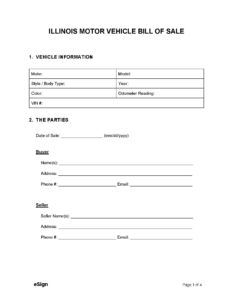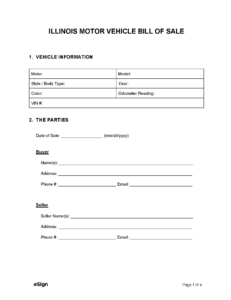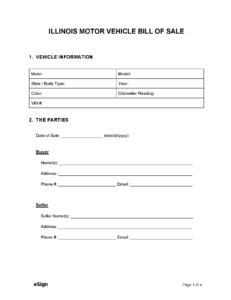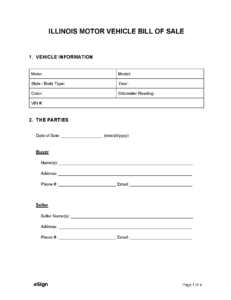When you’re buying or selling a vehicle in the Prairie State, navigating the paperwork can sometimes feel a bit overwhelming. Among the many documents you might encounter, one stands out as absolutely crucial for a smooth and legally sound transaction: the bill of sale. It’s more than just a receipt; it’s a vital record that protects both the buyer and the seller, clearly documenting the transfer of ownership and all the specific details of the sale.
This document acts as your official proof, preventing potential headaches down the road. Whether you’re upgrading your ride or passing on your beloved sedan to a new owner, having a properly filled out bill of sale ensures that all parties are on the same page and that you’re complying with Illinois state requirements. It’s a simple step that offers significant peace of mind.
Why a Bill of Sale is Your Best Friend in an Illinois Car Transaction
Think of a bill of sale as the official handshake for your vehicle transaction, but in written, legally binding form. For both the buyer and the seller of a car in Illinois, this document serves as indisputable proof that a transfer of ownership has taken place, detailing the terms and conditions of that exchange. It protects the seller from any future liabilities related to the vehicle once it’s out of their hands, and it provides the buyer with the necessary documentation to register the vehicle in their name and prove legal ownership. Without it, you could be left vulnerable to disputes, unexpected fines, or even issues with vehicle registration.
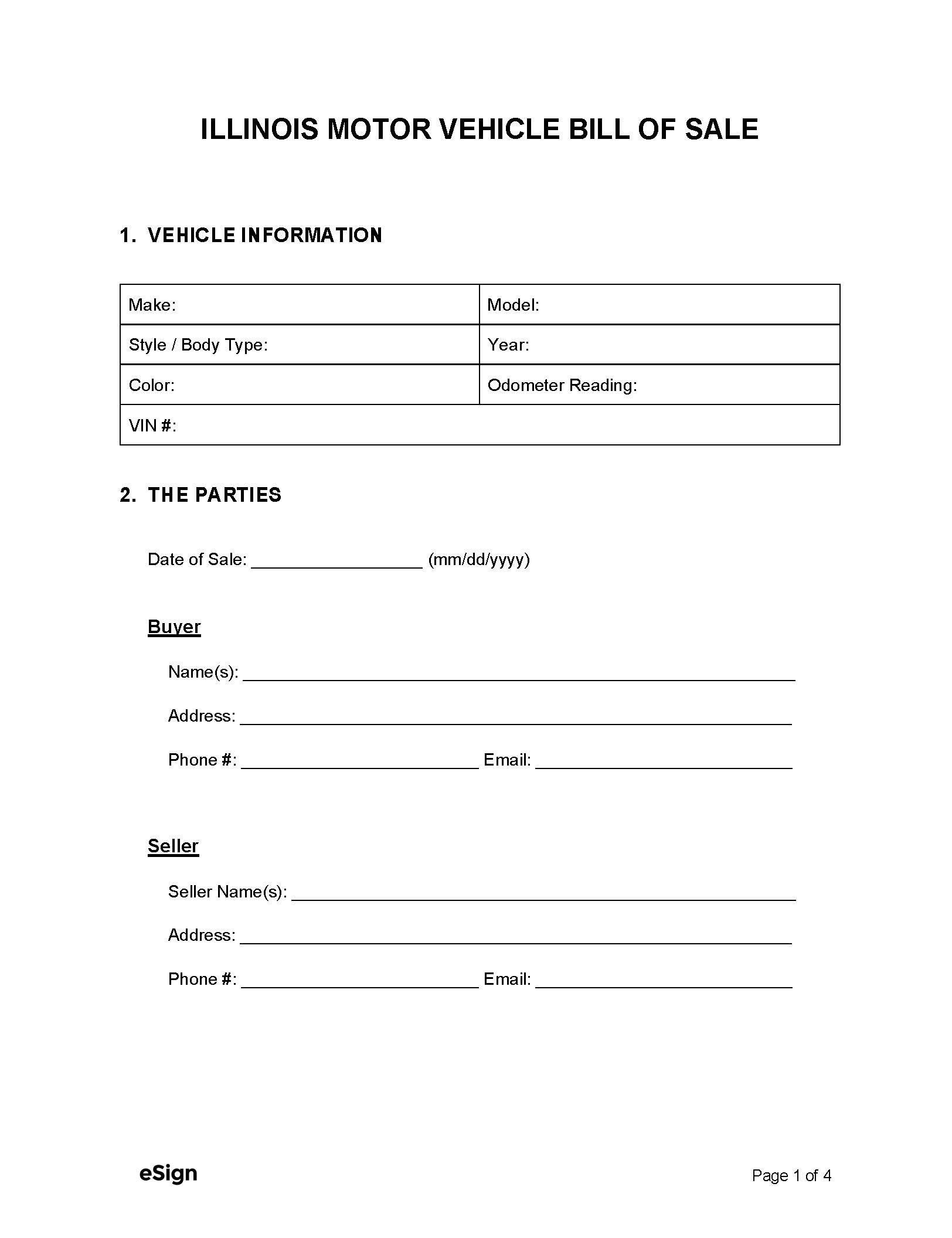
For the seller, this document is a shield. Once your car is sold and the bill of sale is signed, it legally shifts responsibility for the vehicle to the new owner. This means if the new owner gets a parking ticket, is involved in an accident, or encounters mechanical issues after the sale, you, as the previous owner, are typically no longer liable. It’s essential for demonstrating to the Illinois Secretary of State that you no longer own the vehicle, which can prevent problems with your insurance or even property taxes.
Conversely, for the buyer, the bill of sale is your proof of purchase and a safeguard against fraud. It verifies that you are the rightful owner of the vehicle and serves as a critical document when you go to the Illinois Secretary of State’s office to title and register the car. Should any questions arise about the vehicle’s condition at the time of sale, or if there were any agreed-upon terms, this document provides a written record to refer back to. It’s also crucial for confirming the purchase price, which can be important for tax purposes.
In essence, a comprehensive bill of sale covers all the bases, ensuring clarity and transparency for everyone involved. It’s not just a formality; it’s a foundational element of a secure and legitimate vehicle sale or purchase in Illinois.
Key Information to Include in Your Illinois Car Bill of Sale
To ensure your bill of sale is effective and legally sound, it must contain several key pieces of information. Missing even one detail can lead to complications later on. Here’s what you should always include:
- Full names and addresses of both the buyer and the seller.
- The vehicle’s make, model, year, and color.
- The Vehicle Identification Number (VIN), which is unique to your car.
- The odometer reading at the time of sale (this is especially important in Illinois).
- The agreed-upon purchase price of the vehicle.
- The date of the transaction.
- Any specific conditions of the sale, such as “as-is” clauses.
- Signatures of both the buyer and the seller.
Finding and Customizing Your Bill of Sale Template for Car Illinois
Finding a reliable bill of sale template for car Illinois transactions is easier than you might think. Numerous online resources, including legal document websites, automotive enthusiast forums, and even state-specific Department of Motor Vehicles or Secretary of State websites often provide downloadable templates. The key is to ensure that the template you choose is specifically tailored for vehicle sales and ideally, includes provisions relevant to Illinois law, such as the emphasis on odometer readings. While many generic templates exist, one designed with Illinois specifics in mind can save you time and ensure compliance.
The great advantage of using a dedicated bill of sale template for car Illinois is that it comes pre-formatted with all the essential fields. This significantly reduces the risk of forgetting a crucial piece of information. Instead of starting from scratch, you simply fill in the blanks with the correct details for your specific transaction. These templates often guide you through the process, prompting you for everything from the VIN to the purchase price and any specific clauses, like an “as-is” statement, which is particularly relevant in private sales.
Once you have your template, the most important step is accurately filling it out. Double-check every piece of information, especially the Vehicle Identification Number and the odometer reading. These details are vital for proper titling and registration in Illinois. It’s a good practice to have both parties review the completed document together to ensure accuracy and mutual understanding before signing. A minor error, like a typo in the VIN, could lead to significant bureaucratic headaches down the line.
After the template is completely and accurately filled out, and both the buyer and seller have signed it, make sure to create multiple copies. Both parties should retain an original signed copy for their records. The buyer will need their copy to register the vehicle with the Illinois Secretary of State, and the seller will want theirs as proof of divestment. Keeping this document safe and accessible is crucial, as it serves as your official record of the transaction for potential future reference, including tax purposes or any unforeseen disputes.
In the end, securing a proper bill of sale for your car transaction in Illinois isn’t just about ticking a box; it’s about protecting yourself and ensuring a smooth, transparent transfer of ownership. Taking the time to use a clear and comprehensive template, filled out with care, will provide both buyer and seller with the peace of mind they deserve. It’s a small effort that yields significant legal and practical benefits, setting the stage for a positive experience for everyone involved in the vehicle exchange.
